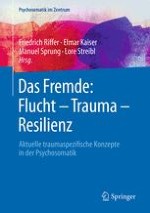Zusammenfassung
Im Laufe ihres Lebens sind die meisten Menschen mit zumindest einem potenziell traumatischen Ereignis konfrontiert. Die Reaktionen auf diese Ereignisse sind jedoch sehr unterschiedlich. Ein Teil der Betroffenen ist überwältigt von den traumatischen Ereignissen und entwickelt eine psychische Störung, z. B. eine posttraumatische Belastungsstörung. Erstaunlicherweise reagieren aber auch einige Betroffene resilient selbst auf schlimmste traumatische Ereignisse, d. h., sie sind widerstandsfähig und zeigen keinerlei negative Folgen. Manche Betroffene scheinen sich sogar infolge traumatischer Erlebnisse in einer positiven Art und Weise weiterzuentwickeln (d. h., posttraumatisch zu reifen). Dieses Kapitel beschäftigt sich mit relevanter Forschung zur psychologischen Resilienz und posttraumatischen Reifung unter besonderer Berücksichtig des Zusammenhangs zwischen Trauma und Schmerz.











